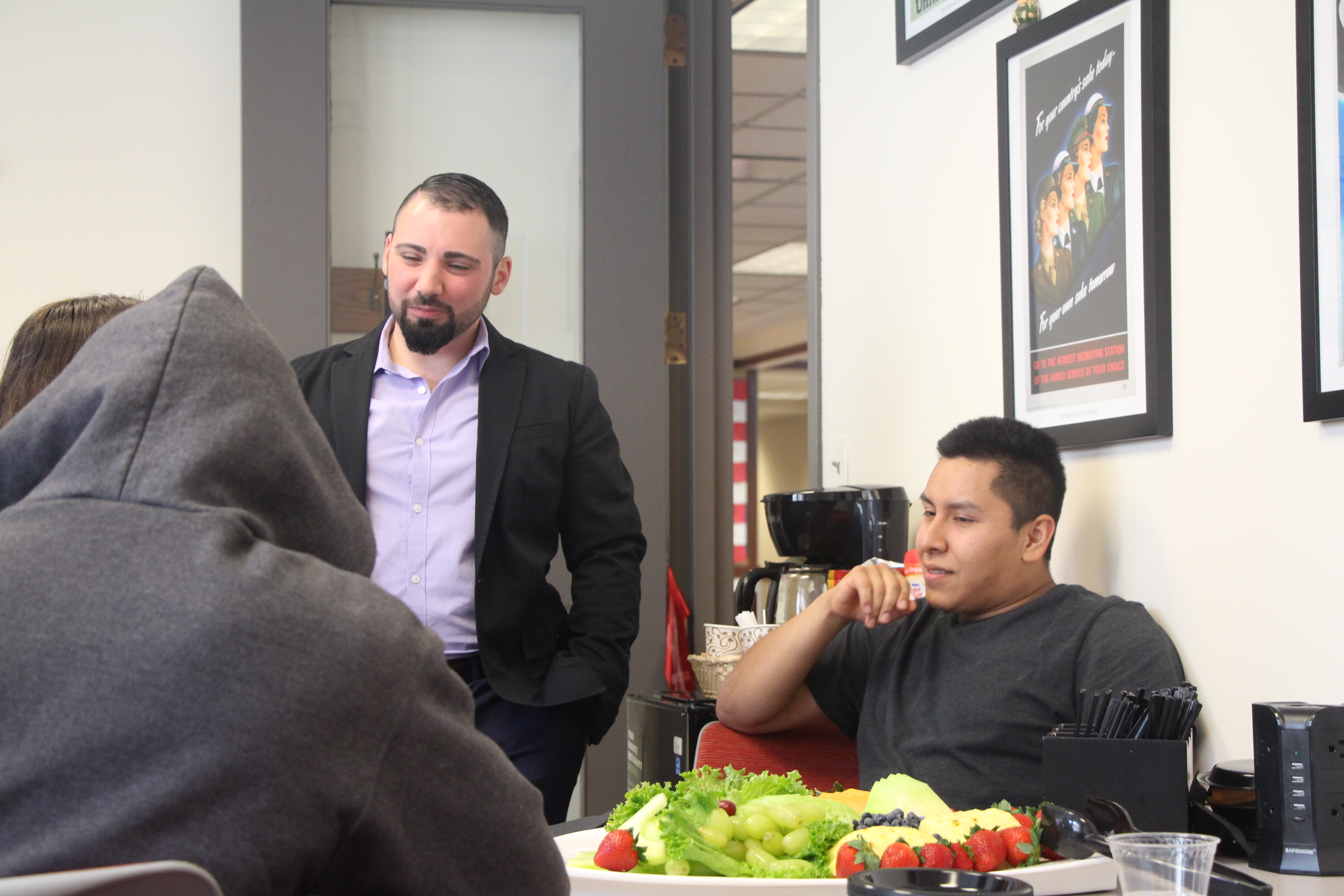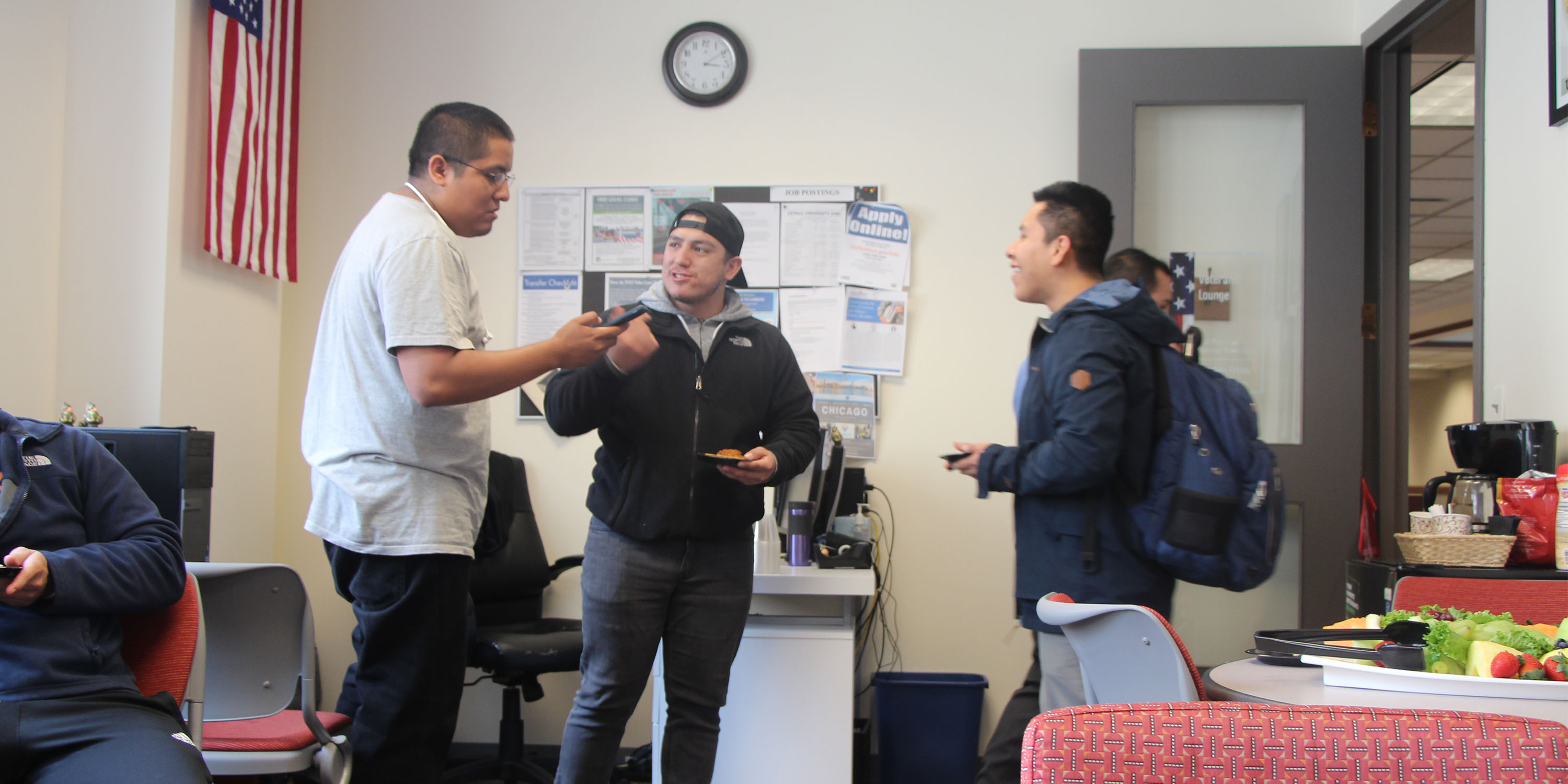On the 11th floor of the DePaul Center, between the elevators and the cafeteria, a crowd gathered around a doorway to a small room. At first glance, nothing about the spectators seemed special. They looked like normal college students, some wearing jeans and sweatshirts, and others in button-downs and khakis. Most of the crowd shared one unique characteristic: they were United States military veterans.
The DePaul Student Veterans Union, or SVU, cut the ribbon on a new veterans lounge on Monday, October 1. Andrew Athanasiadis, President of SVU, said the veteran community at DePaul needed the lounge. The veterans had been using the commuters lounge, but felt they needed their own space.
“The veterans community is a little bit different to any other groups that we have here on campus, and we wanted a space where we can come and just hang out and be ourselves,” said Athanasiadis, a former Air Force reserve and current Navy reserve. “We can talk about what we want to talk about because we all have those shared experiences.”
DePaul has the largest student veteran population of any university in Chicago. The Student Veterans Union is an on-campus organization that has the mission of strengthening the community of veterans at DePaul.
“When you are in the military day to day it’s your everyday job, you have support systems. You have everything to hold you up while you are working, while you are on your day-to-day life and personal life,” said Athanasiadis. “That support structure disappears when you come back to civilian life and you go to school. We wanted to create a community where we could support one another.”
The new lounge is a small room packed with a desk, computers, a table with chairs, cushioned seats, a television and a coffee maker. The bulletin board has job postings, event flyers and reminders.

(Chris Silber, 14 East)
Getting the lounge was not an easy process. James Stewart, director of Adult, Veteran and Commuter Student Affairs at DePaul, said the process took a few years of effort and organization from the student veterans to advocate for the space. SVU faced hurdles finding an open space as well as organizing people to make proposals and file paperwork to make that space an official veterans lounge.
“Over the years, students have really advocated for this [lounge]. Last spring the newest leadership of Student Veterans Union really mobilized,” said Stewart. “They wrote a very formal proposal, going to a lot of different staff to really advocate for this need that they saw.”
George Murad, vice-president of SVU and veteran of the Marine Corps, said he got the idea for the lounge from when he attended the College of DuPage.

Murad socializes with other veterans in the new Veteran’s Lounge. (Chris Silber, 14 East)
“I saw that the community over there was such a strong community because that lounge, everybody got to walk in and say, ‘Hey, you’re in my class. You’re a veteran too? That’s awesome.’”
Heather Duke, current treasurer and former vice-president for SVU, helped put together the proposal that eventually resulted in the new lounge.
“I put together along with the previous president a proposal that went through the administration for the lounge to open to serve veterans in both a studious manner and for camaraderie,” said Duke, a Navy veteran. She cut the ribbon along with Eugene L. Zdziarski, the vice president for student affairs at DePaul.

Duke and Zdziarski cut the ceremonial ribbon for the new Veteran’s Center. (Chris Silber, 14 East)
Murad said SVU helps veterans overcome the initial challenges of coming back to school. Most veterans are older than other students, and many face a culture shock.
“They come from a very regimented lifestyle, and they go into a civilian lifestyle, which is very free and open,” he said. “They can do what they want and sometimes it’s just very hard to adjust to that.”
The Student Veterans Union helps veteran students on a variety of fronts. Murad said they help veterans who have issues finding employment, have trouble in class and or need help finding housing. “You come and utilize that network that we’ve all built here together.”
Many DePaul veterans grew up in Chicagoland and returned during service or after serving.
“I’m a native of Chicago, I enlisted in 2009, served for a few years. After I got out, I decided to move back, and DePaul was the first school I thought of,” said Hector Brito, a senior accounting major and six-year Marine veteran.
Brito said DePaul is a great school financially for veterans to attend.
“Most of the veterans here are using the Post 9/11 G.I. Bill where each veteran is granted 36 months of actual schooling time,” said Brito. “DePaul also participates in what is called the Yellow Ribbon Program, so if there’s an amount that the veteran stipend will not cover, DePaul University has committed to work with [Veterans Affairs] to cover that extra stipend so no money has to come from the veteran’s pocket directly.”
The ribbon-cutting ceremony only lasted fifteen minutes, but people stayed, talked and ate food for more than two hours. Chicken wings, beef Kabobs and a fruit platter were available for event-goers and passers-by to snack on.
The lounge is meant to be an open and welcoming space. Brito said SVU is an organization that fosters camaraderie among many types of people, including non-veteran students.
“Veterans from every branch, including reserves that are currently serving, can come and hang out,” he said. “They also open their doors to non-veteran students. It’s a community for those who support veterans.”
Stewart said veterans offer a much needed perspective to the DePaul community.
“They all bring great resilience and attributes and diverse experiences to the classroom that makes the educational experience better,” said Stewart. “A veteran student in a class is bringing a world of experience and perspective to class discussions and group projects.”
Brito said professors benefit from having students with military experience because they have worked in a variety of fields, often internationally, and many have had other life experiences like raising a child.
“Sometimes professors are able to use veterans as an example to provide a little more credibility to how things work in the real world.”
Re-entering academia can be challenging for veterans at first, but Brito said that for most veterans the transition can be a welcoming experience.
“It’s definitely a change of pace, but more than anything I think it’s a welcome change of pace. Coming back in your 20s, possibly even your 30s, I think you just take school a bit more seriously.”
Header image by Chris Silber




14 Speaks: Refugees Forced from Home, Resources for Student Veterans – Fourteen East
5 October
[…] new stories: one from associate editor Christopher Silber and contributor Hector Cervantes on a new lounge for student veterans and another from director of development Mikayla Rose Price on the Forced From Home refugee […]
Memorial Day is a Holiday Open to Interpretation – Fourteen East
27 May
[…] Instead of checking-up on his service buddies like he normally does, U.S. Army veteran and DePaul senior Ricardo Rivera spent last Memorial Day in the sun. He participated in the Ruck March, a 20-mile march from Glencoe to Evanston, with other members of the DePaul Student Veterans Union. […]
Veterans Community at DePaul Continues to Engage with their Lounge to Foster Relationships – Fourteen East
6 December
[…] in and outside of their lounge after DePaul Student Veterans Union cut the ribbon for the new lounge on October 1, […]